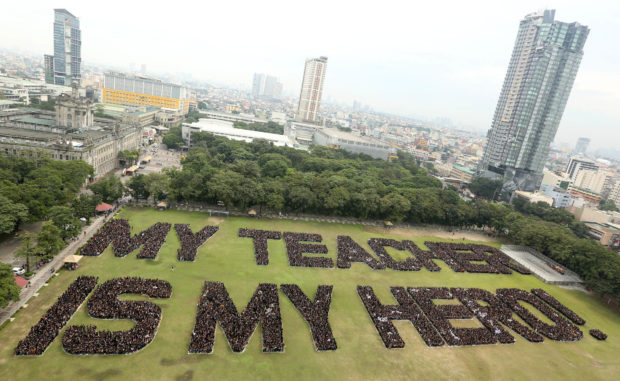
More than 16,000 students and staff from the University of Santo Tomas pay tribute to teachers by forming the world’s largest human sentence. —MARIANNE BERMUDEZ
With the “dismal” results of the teacher licensure examinations in almost a decade, an education advocacy group called on the government to introduce reforms that would restructure the country’s mechanisms in choosing teachers.
Based on a study they made on teacher quality in the country, Love Basillote, executive director of the Philippine Business for Education (PBED), said that since 2009 the passing rate of teachers averaged at only 31 percent. She noted that this is way below the government’s target passing rate of 53 percent.
The same study also showed that the average passing rate of teachers is behind that of those who took up medicine, the sciences, maritime, engineering, accountancy and agriculture.
Earlier, PBED said that the “poor quality” of teaching in the country has resulted in students “not learning” and not becoming competitive workers.
Because of this, Basillote said that it is high time for government to institutionalize a “three-strike” policy on examinees, which would force those who would not pass the board to undergo a mandatory review.
She added that the Board of Professional Teachers, which administer the exam with the Professional Regulation Commission, should also release the test questions so that it can be “scrutinized if it is a good screening mechanism.”
Currently, questions for the teachers’ board exam are not released to the public, hindering the public and various education groups from knowing if its content coverage are apt and stringent enough.
Basillote also called on the lowest performing education schools to be closed down, noting that it is a “disservice to the families” that while they have access to education, it does not guarantee them of landing a job.
Most of the schools listed by PBED as having “consistently poor performance” in the last 16 teacher licensure exams are located in the Autonomous Region in Muslim Mindanao. Basillote noted though that there are various factors which may have affected their performance in board exams, such as the conflict and lack of opportunities in the region.
For elementary teachers, these schools are Marawi Capitol Foundation College, Marawi Islamic College, Mindanao Islamic Computer College, Pacasum College, Gani L. Abpi Colleges Inc., Lapak Agricultural College-Siasi, South Upi College, Southern Negros College, La Consolacion College-Daet, and Camarines Norte State College-Labo.
For secondary teachers, these schools are Hadji Batu School of Arts and Trades, Lanao National College of Arts and Trades, Tawi-Tawi Regional Agricultural College, Lapak Agricultural College, Lapak Agricultural College-Siasi, Jamiatu Muslim Mindanao, Shariff Kabunsuan College, Libacao College of Science and Technology, Datu Mala M. Mindanao Islamic College, and Southwestern Mindanao Islamic Institute.
According to Basillote, another way to ensure that students get quality education is to implement a “more stringent admission process” for teachers. This meant that only the top 20 percent of a graduating class may be allowed to take an education course.
PBED also suggested the implementation of a probation period of at least three years for new teachers, particularly in public schools, similar to that in developed countries. This would help ensure that teachers would have more insight and experience before they are made to teach a class. /jpv